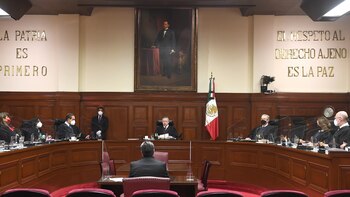
With four votes in favor and seven against, the Plenum of the Supreme Court of Justice of the Nation (SCJN) recognized the constitutionality of various articles of the reform of the Electricity Industry Law, published on March 9, 2021 after being approved by the Union Congress with the aim of strengthening the Federal Commission of Electricity (CFE) versus private power generators.
Regarding environmental matters, Minister Jorge Mario Pardo Rebolledo stressed that this reform does not necessarily require the CFE to generate clean energy and allows it to continue using plants that operate from fossil sources. It should be noted that Mexico has the goal by 2030 to reduce its black carbon emissions and produce 43% of clean energy by that year.
Minister Norma Lucía Piña Hernández recalled that Mexico established environmental commitments in the Constitution, and that our country is signed to international agreements on climate change, in addition to the Paris Agreement, to which our country is subscribed.
In accordance with the General Law on Climate Change, our country is committed to reducing the emission of greenhouse gases, by replacing energy from fossil sources with renewable ones. However, with this reform, the CFE will have priority in dispatch over private generators even if the production of the State company relies, in part, on non-renewable energy.

According to data from the United Nations (UN), it is estimated that our country emits approximately 1.4% of total greenhouse gases globally. The Paris Agreement invited countries to present development strategies with low greenhouse gas emissions since 2020.
Mexico ratified its integration into the Paris Agreement, and in it agreed on new commitments to action on renewable energy and to abandon fossil fuels. In this regard, the current federal government indicates that it will gradually move towards a sustainable model, however, the current reform provides the possibility that the National Electricity System will continue to rely on plants with previous technologies in order to guarantee grid stability.
With the votes of Ministers Loretta Ortiz Ahlf, the project's rapporteur, Yasmín Esquivel, as well as Ministers Arturo Zaldívar and Alfredo Gutiérrez Ortiz Mena, the Court endorsed the articles defining electricity coverage contracts with commitment to physical delivery and legacy contracts for basic supply. With this decision, the regulatory framework remains in force in addition to those that indicate criteria for determining the allocation and dispatch in order to meet the demand for electricity in the system.
The SCJN also acknowledged the validity of the articles that provide for the possibility of revoking permits obtained if they are considered to be fraudulent; as well as to review, renegotiate or terminate contracts signed with independent producers.
Despite the fact that seven ministers chose to declare the 2021 reform invalid, four votes were enough to dismiss the unconstitutional action 64/2021, promoted by opposition senators against the Decree to amend the Electricity Industry Law.
On this decision of the highest court, the Mexican Institute for Competitiveness, considered that the country's competitiveness is reduced and the existence of the electricity market is at risk because it benefits the “most expensive and polluting generation plants to the detriment of the environment”.
As reported by IMCO, “the main losers of the reform are renewable and clean energy plants”, since the order of dispatch stipulated by the reform gives priority to new electricity coverage contracts with a commitment to physical delivery, which in fact benefits the power plants in the first place CFE, which, according to the A.C., “operate from fossil fuels.”
KEEP READING:
Últimas Noticias
Debanhi Escobar: they secured the motel where she was found lifeless in a cistern

The oldest person in the world died at the age of 119

Macabre find in CDMX: they left a body bagged and tied in a taxi
The eagles of America will face Manchester City in a duel of legends. Here are the details

Why is it good to bring dogs out to know the world when they are puppies




